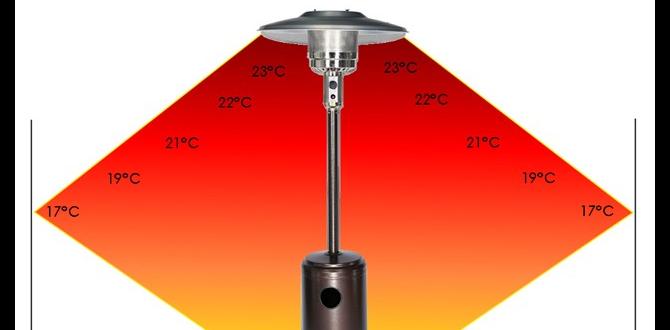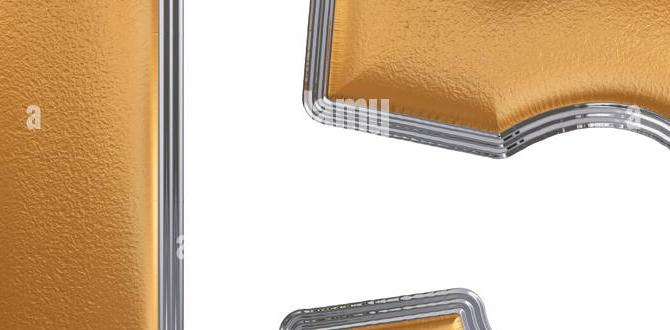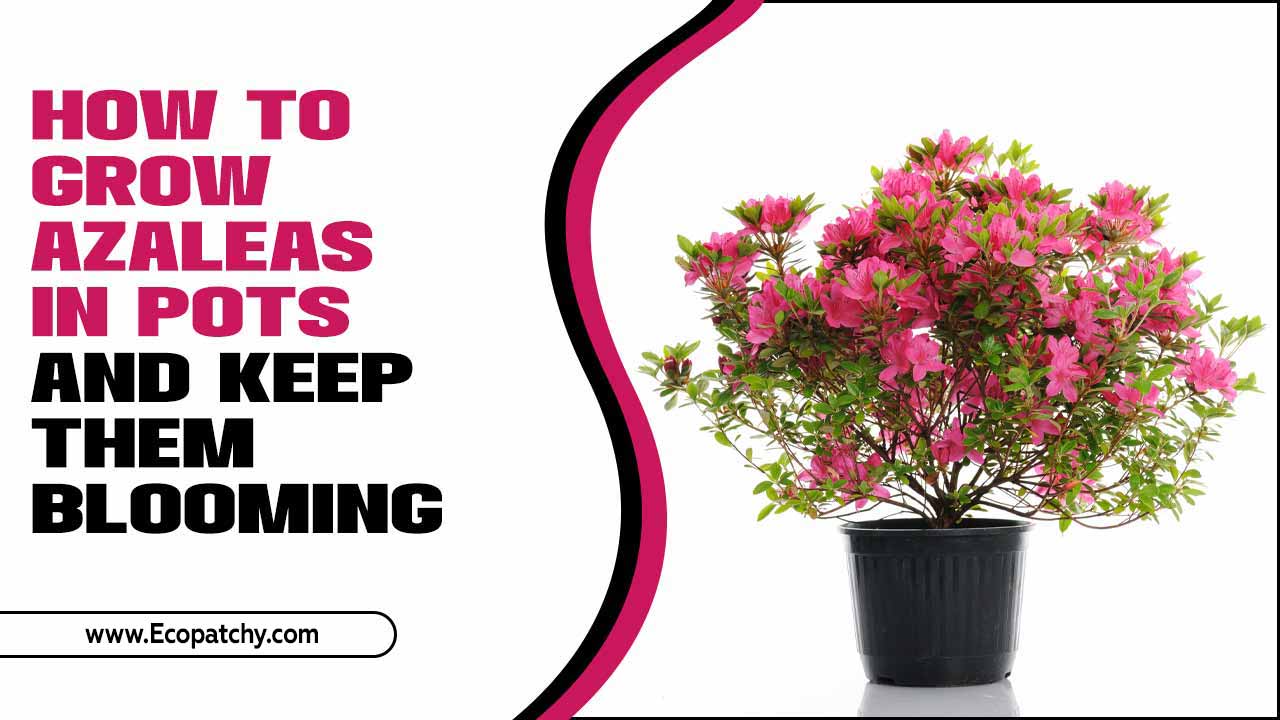Have you ever thought about where your gardening soil comes from? Many gardeners are discovering the wonders of coconut coir. This natural product comes from the husk of coconuts. It is not just a neat gardening tool; it might change how you grow your plants.
Coconut coir is lightweight and simple to use. It helps with water retention and provides nutrients for plants. Imagine planting flowers that bloom brighter or vegetables that grow faster. Sounds exciting, right? That’s the power of coconut coir.
Did you know that coconut coir is an eco-friendly choice, too? It uses materials that would otherwise go to waste. So, by using it, you’re helping the environment and your garden at the same time. How cool is that?
Let’s dive deeper into the amazing benefits of coconut coir for gardening. Your plants will thank you!
Coconut Coir For Gardening: Benefits And Uses Explained Coconut Coir, A Natural Fiber Extracted From The Husk Of Coconuts, Has Gained Popularity As An Eco-Friendly Alternative To Traditional Gardening Media. Not Only Is It Sustainable, But It Also Provides Numerous Benefits To Plants And Soil Health. In This Article, We Will Explore The Various Advantages Of Using Coconut Coir For Gardening, How To Use It Effectively, And Its Potential Impact On Plant Growth. What Is Coconut Coir? Coconut Coir Is Made From The Fibrous Husk That Surrounds Coconut Shells. It Is Processed Into Various Products, Including Coir Pith (Also Known As Coco Peat), Coir Chips, And Coir Fiber. These Products Are Versatile And Can Be Used In Different Gardening Applications, Ranging From Potting Mixes To Soil Amendments. Benefits Of Coconut Coir In Gardening 1. **Water Retention**: One Of The Most Significant Advantages Of Coconut Coir Is Its Ability To Retain Moisture. This Property Makes It An Excellent Choice For Gardeners In Arid Regions Or Those Looking To Reduce Their Watering Frequency. Coconut Coir Can Hold Water Up To Eight Times Its Dry Volume, Ensuring That Plants Have A Consistent Moisture Supply. 2. **Aeration And Drainage**: Unlike Traditional Potting Soils That May Compact Over Time, Coconut Coir Remains Loose And Airy. This Aeration Promotes Healthy Root Growth And Prevents Waterlogging, Which Is Crucial For Plant Health. 3. **Ph Neutral**: Coconut Coir Has A Near-Neutral Ph, Making It Suitable For A Wide Variety Of Plants. This Characteristic Allows It To Be Used In Many Gardening Situations Without Affecting The Acidity Or Alkalinity Of The Soil. 4. **Sustainable And Eco-Friendly**: Harvesting Coconut Coir Is Environmentally Friendly As It Utilizes Waste Products From Coconut Processing. By Opting For Coconut Coir, Gardeners Can Support Sustainability And Reduce Reliance On Peat Moss, Which Is Often Harvested Unsustainably. 5. **Rich In Nutrients**: Coconut Coir Contains Beneficial Nutrients That Can Enhance Plant Growth. While It May Require Some Supplementation With Fertilizers, Coir Does Provide A Base For Healthy Root Systems And Plant Development. How To Use Coconut Coir In Your Garden – **Potting Mix**: Combine Coconut Coir With Perlite Or Vermiculite To Create A Well-Draining Potting Mix Ideal For Potted Plants. – **Soil Amendment**: Incorporate Coconut Coir Into Existing Soil To Improve Structure, Moisture Retention, And Aeration, Especially In Sandy Or Clay Soils. – **Seed Starting**: Use Coconut Coir As A Seed-Starting Medium. It Provides A Sterile Environment For Seedlings To Thrive Without The Risk Of Disease Typically Associated With Other Organic Materials. – **Hydroponics**: Coconut Coir Is Also Popular In Hydroponic Systems, Where Its Excellent Water Retention And Aeration Properties Support Hydroponic Plant Growth. Conclusion Coconut Coir For Gardening Is An Innovative And Sustainable Choice For Both Amateur And Professional Gardeners. Its Water Retention, Aeration Properties, And Eco-Friendliness Make It A Valuable Addition To Any Gardening Toolkit. Whether Used As A Potting Mix, Soil Amendment, Or In Hydroponics, Coconut Coir Can Enhance Plant Growth And Overall Garden Health. Embrace The Benefits Of Coconut Coir And See The Difference It Can Make In Your Gardening Journey.
Coconut Coir for Gardening
Coconut coir is a natural fiber from coconut husks. It’s perfect for gardening. Why? It’s lightweight and holds moisture well. Gardeners love it because it helps plants grow strong! Did you know that coir is eco-friendly? It breaks down slowly and enriches the soil. You can use it in pots or as mulch. Whether you’re growing flowers or veggies, coconut coir is a fantastic choice to help your garden thrive. Give it a try!What is Coconut Coir?
Definition and origin of coconut coir. Different types of coconut coir available in gardening.Coconut coir comes from the fibers of coconuts. It is a natural material used in gardening. This eco-friendly option helps plants grow by retaining water and improving soil. Coconut coir is made from the husk of the coconut. The types of coconut coir include:
- Loose coir for potting mixes
- Bricks that expand with water
- Coir mats for seed starting
Choosing the right type helps plants thrive! Isn’t nature amazing?
What is the main use of coconut coir in gardening?
Coconut coir is mainly used for plant growth, soil improvement, and water retention.
Types of coconut coir used in gardening:
- Loose coir
- Compressed blocks
- Coir pots
- Coir mats
Benefits of Using Coconut Coir in Gardening
Environmental advantages of coconut coir. Comparison with traditional soil and other growing mediums.Coconut coir brings many benefits to gardening. It is eco-friendly and helps save our planet. Using coir means less plastic waste and fewer chemicals. Let’s see why it’s a smart choice:
- Renewable Resource: Coir comes from coconut husks, which are made every year.
- Better Water Retention: It holds water well, giving plants the moisture they need.
- Improves Soil Structure: Coir makes soil loose and fluffy, helping roots grow.
- Light Weight: It’s easier to carry than heavy soil.
- Free from Pests: Unlike regular soil, coir has no bugs or harmful diseases.
Compared to traditional soil, coconut coir supports healthy plant growth. It’s great for pots and gardens. Making the switch can help your plants thrive!
Why is coconut coir better than soil?
Coconut coir is lighter, holds more water, and encourages better root growth.
How Coconut Coir Improves Soil Quality
Retention of moisture and nutrients. Impact on soil aeration and drainage.Coconut coir works wonders for your garden! First, it keeps moisture in the soil like a cozy blanket. This means your plants stay happy and hydrated. Did you know that coir can hold up to 10 times its weight in water? Talk about a thirsty plant’s dream!
Next, it helps with soil aeration and drainage. Imagine your soil having tiny air pockets, just like a sponge! This setup lets roots breathe and grow strong. Good drainage prevents waterlogging, which plants despise. With coconut coir, your soil becomes a superstar garden party, mixing moisture and air like a pro!
| Benefits | How it Helps |
|---|---|
| Moisture Retention | Holds up to 10 times its weight in water |
| Soil Aeration | Creates air pockets for healthy root growth |
| Drainage | Prevents waterlogging, keeping roots happy |
Types of Plants That Thrive in Coconut Coir
Suitable plants for indoor and outdoor gardening. Specific use cases for vegetables, flowers, and herbs.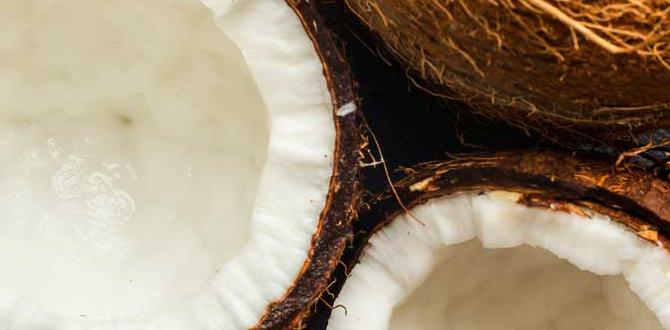
Coconut coir is great for many plants! It holds moisture well. This makes it ideal for indoor and outdoor gardening. Here are some plants that love coconut coir:
- Vegetables: Tomatoes, peppers, and lettuce grow strong in coir. They thrive with its moisture retention.
- Flowers: Petunias, geraniums, and orchids appreciate the airy texture. They develop vibrant blooms.
- Herbs: Basil, mint, and parsley flourish. Coir helps herbs grow lively and fresh.
In summary, coconut coir supports a variety of plants, from vegetables to beautiful flowers and fresh herbs. Happy gardening!
What plants can grow in coconut coir?
Plants that thrive in coconut coir include vegetables like tomatoes and lettuce, flowers such as petunias and orchids, and herbs like basil and mint. They enjoy the moisture and support this material offers.
How to Use Coconut Coir in Your Garden
Preparation and application methods. Tips for mixing with other growing mediums.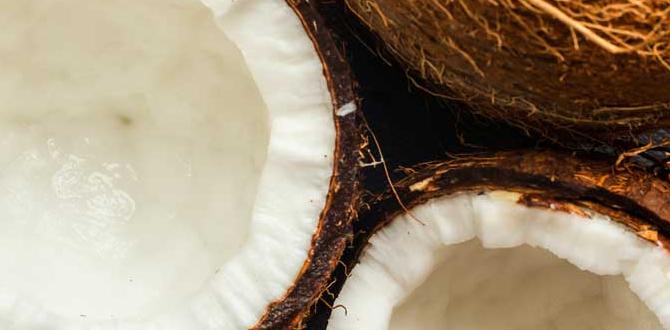
Coconut coir is a fantastic addition to your garden. First, prepare it by soaking the coir in water for a few hours. This helps it expand and become fluffy. Once it’s ready, you can mix it with soil or compost. Aim for a mix like this:
| Material | Ratio |
|---|---|
| Coconut Coir | 1 part |
| Soil | 2 parts |
| Compost | 1 part |
This mix helps with water drainage and keeps roots nice and cozy. Remember, coir loves to party with other mediums—mix it well! A sprinkle of humor: “Why did the plant break up with the soil? It found a coir-mate!”
Common Challenges and Solutions
Issues such as salt content and pest management. Best practices for troubleshooting problems.
Growing plants with coconut coir can be fun, but it comes with its own set of hiccups! First up is salt content. If your plants look a bit droopy, check the coir; too much salt can be a problem. Leaching the coir with water can help wash away the bad stuff. Then we have pest management. No one likes uninvited guests! Use natural pest repellents to keep them at bay. Here’s a handy table for quick tips:
| Issue | Solution |
|---|---|
| High Salt Content | Leach with fresh water |
| Pests | Use natural repellents |
With these tricks, your garden will thrive, and you’ll have a happy bunch of plants. And remember, even if your plants are feeling a bit cranky, a little love goes a long way!
Comparative Analysis: Coconut Coir vs. Other Soil Alternatives
Pros and cons of coconut coir versus peat moss and perlite. Cost analysis and longterm sustainability.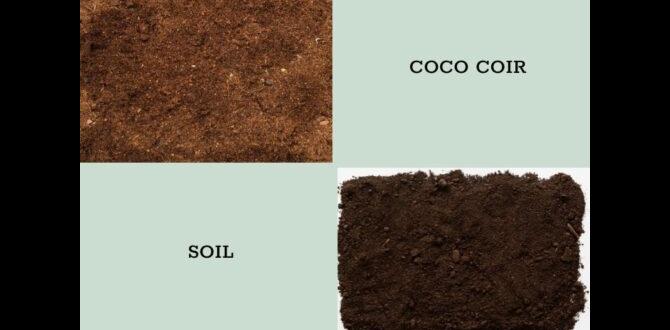
Coconut coir is a great choice for gardening, especially compared to peat moss and perlite. Let’s compare their pros and cons. Coconut coir is renewable, while peat moss can harm the environment. Coir holds moisture and nutrients well, making it easy for plants to grow. However, it can be more expensive than peat moss. Perlite helps with drainage but doesn’t provide nutrients.
- Pros of Coconut Coir: Renewable, moisture-retaining, rich in nutrients.
- Cons of Coconut Coir: Can be pricier than alternatives.
- Peat Moss: Cheaper, but not sustainable.
- Perlite: Great for drainage, but lacks nutrients.
Choosing the right soil is important for your garden’s future. Coconut coir offers a sustainable choice for long-term growth. While the cost might be higher now, it can save money on nutrients later.
Is coconut coir better than peat moss?
Yes, coconut coir is better because it is eco-friendly and helps plants thrive.
Is coconut coir worth it for gardening?
Yes, coconut coir is worth it due to its sustainability and benefits for plants.
FAQs About Coconut Coir in Gardening
Common questions and expert answers. Myths and misconceptions surrounding coconut coir use.Coconut coir is gaining popularity in gardening, but many still have questions. Here are some common ones:
What is coconut coir?
Coconut coir is a natural fiber from coconut husks. It helps retain moisture and provides good drainage for plants.
Can I use coconut coir instead of soil?
Yes, you can! Coconut coir makes a great soil alternative. It supports healthy root growth and is eco-friendly.
Are there any myths about coconut coir?
- It’s too acidic. Many believe coir is overly acidic, but it’s generally pH neutral.
- It causes pests. Some fear coir attracts pests, but it’s usually pest-free.
How do I store coconut coir?
Keep it in a dry place and away from direct sunlight. This will ensure it stays fresh and usable.
Where to Purchase Quality Coconut Coir Products
Recommended retailers and brands. Tips for identifying highquality coir products.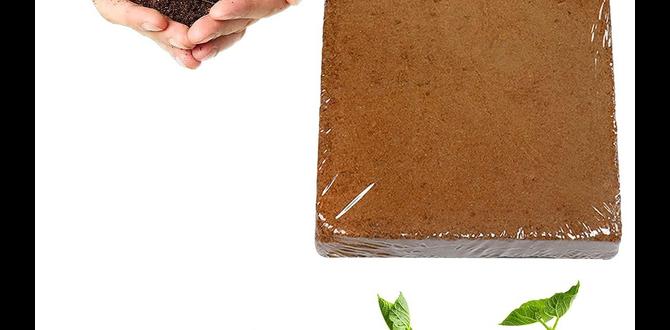
Finding quality coconut coir products is easy with the right guidance. Look for trusted retailers like Home Depot, Amazon, and Walmart. These places often have good reviews and options. When checking products, aim for:
- Natural Color: It should be light brown.
- Texture: Coir should feel soft and fluffy.
- Moisture Retention: Check for high water-holding capacity.
Always read the labels for added information. Quality coir improves plant growth and makes gardening easier!
What should I look for in coconut coir products?
Focus on organic materials, soft texture, and strong moisture retention. These qualities ensure healthy plants.
Conclusion
In conclusion, coconut coir is a fantastic choice for gardening. It helps retain moisture and improves soil quality. You can use it for potted plants or in your garden beds. It’s eco-friendly too! If you want to learn more, check out articles or videos on using coir effectively. Let’s start planting and gardening with coconut coir today!FAQs
What Are The Benefits Of Using Coconut Coir As A Growing Medium For Plants In Gardening?Coconut coir is great for gardening because it helps plants grow strong. It holds water well, so your plants stay moist. Coir also has good air flow, helping roots breathe. It’s friendly to the environment since it comes from coconuts. Plus, it lasts a long time, so you can use it again and again!
How Does Coconut Coir Compare To Traditional Gardening Soils In Terms Of Water Retention And Aeration?Coconut coir holds more water than regular soil. This means plants can stay moist longer. It also has good airflow, helping roots get oxygen. Traditional soil can be heavy and clay-like, which holds water differently. So, coir can be a better choice for keeping plants happy!
Can Coconut Coir Be Used As A Substitute For Peat Moss, And What Environmental Advantages Does It Offer?Yes, coconut coir can replace peat moss. It comes from the husk of coconuts, making it a natural choice. Using coir helps protect our wetlands, which are important for plants and animals. It’s also better for the environment because it keeps carbon in the soil. This way, we help our planet while gardening!
What Are The Steps For Preparing Coconut Coir Before Using It In Potting Mixes Or Garden Beds?To prepare coconut coir, first, you need to soak it in water. This helps it expand and become soft. Next, break it apart using your hands or a tool. After that, let it drain so excess water goes away. Now, it’s ready to mix into your potting mix or garden beds!
Are There Any Potential Drawbacks Or Challenges Associated With Using Coconut Coir In Gardening?Yes, there are some challenges with using coconut coir in gardening. It can be expensive compared to other soil options. Sometimes, it may hold too much water, which can make plants soggy. Also, coir can break down over time, so you might need to replace it. Finally, it does not have many nutrients, so you will need to add fertilizer.
{“@context”:”https://schema.org”,”@type”: “FAQPage”,”mainEntity”:[{“@type”: “Question”,”name”: “What Are The Benefits Of Using Coconut Coir As A Growing Medium For Plants In Gardening? “,”acceptedAnswer”: {“@type”: “Answer”,”text”: “Coconut coir is great for gardening because it helps plants grow strong. It holds water well, so your plants stay moist. Coir also has good air flow, helping roots breathe. It’s friendly to the environment since it comes from coconuts. Plus, it lasts a long time, so you can use it again and again!”}},{“@type”: “Question”,”name”: “How Does Coconut Coir Compare To Traditional Gardening Soils In Terms Of Water Retention And Aeration? “,”acceptedAnswer”: {“@type”: “Answer”,”text”: “Coconut coir holds more water than regular soil. This means plants can stay moist longer. It also has good airflow, helping roots get oxygen. Traditional soil can be heavy and clay-like, which holds water differently. So, coir can be a better choice for keeping plants happy!”}},{“@type”: “Question”,”name”: “Can Coconut Coir Be Used As A Substitute For Peat Moss, And What Environmental Advantages Does It Offer? “,”acceptedAnswer”: {“@type”: “Answer”,”text”: “Yes, coconut coir can replace peat moss. It comes from the husk of coconuts, making it a natural choice. Using coir helps protect our wetlands, which are important for plants and animals. It’s also better for the environment because it keeps carbon in the soil. This way, we help our planet while gardening!”}},{“@type”: “Question”,”name”: “What Are The Steps For Preparing Coconut Coir Before Using It In Potting Mixes Or Garden Beds? “,”acceptedAnswer”: {“@type”: “Answer”,”text”: “To prepare coconut coir, first, you need to soak it in water. This helps it expand and become soft. Next, break it apart using your hands or a tool. After that, let it drain so excess water goes away. Now, it’s ready to mix into your potting mix or garden beds!”}},{“@type”: “Question”,”name”: “Are There Any Potential Drawbacks Or Challenges Associated With Using Coconut Coir In Gardening? “,”acceptedAnswer”: {“@type”: “Answer”,”text”: “Yes, there are some challenges with using coconut coir in gardening. It can be expensive compared to other soil options. Sometimes, it may hold too much water, which can make plants soggy. Also, coir can break down over time, so you might need to replace it. Finally, it does not have many nutrients, so you will need to add fertilizer.”}}]}
